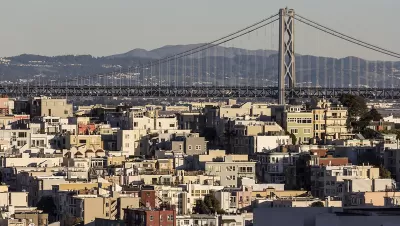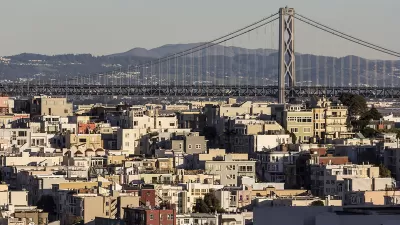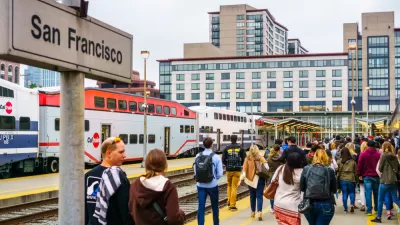The last time the San Francisco Bay Area got together to set a regional agenda on housing and transportation, the Sierra Club and the Tea Party teamed up to oppose the Plan Bay Area. A draft of the new Plan Bay Area 2040 hopes to avoid the drama.

"The only way for the Bay Area to become a relatively affordable place to live again is for cities and counties to be more tolerant of different types of housing, according to the draft of a new regional plan," writes John King.
The Association of Bay Area Governments and the Metropolitan Transportation Commission released a draft of the Plan Bay Area 2040 earlier this month, putting the region's housing challenge front and center, in addition to mapping out "spending priorities for what is estimated to be $303 billion in transportation funding during the life of the plan," according to King.
In addition to providing more detail about the agenda laid out by the draft plan, King also notes the state mandate for the plan, which requires the state to reduce greenhouse gas emissions while making room for new housing. Given that mixture of a state mandate requiring regional and local action and coordination, it shouldn't come as a surprise that an earlier version of the plan ran into opposition "from local Tea Party activists, along with organizations as disparate as the Sierra Club and the Building Industry Association of the Bay Area." This time around, according to King, "the update seems to be moving forward without fireworks."
Last Planetizen heard from Plan Bay Area 2040, the Greenbelt Alliance was touting the draft's target of 30 percent more housing in the region by 2040.
FULL STORY: Blueprint for Bay Area aims to ‘change the dynamics’ of housing crisis

Alabama: Trump Terminates Settlements for Black Communities Harmed By Raw Sewage
Trump deemed the landmark civil rights agreement “illegal DEI and environmental justice policy.”

Planetizen Federal Action Tracker
A weekly monitor of how Trump’s orders and actions are impacting planners and planning in America.

Why Should We Subsidize Public Transportation?
Many public transit agencies face financial stress due to rising costs, declining fare revenue, and declining subsidies. Transit advocates must provide a strong business case for increasing public transit funding.

Understanding Road Diets
An explainer from Momentum highlights the advantages of reducing vehicle lanes in favor of more bike, transit, and pedestrian infrastructure.

New California Law Regulates Warehouse Pollution
A new law tightens building and emissions regulations for large distribution warehouses to mitigate air pollution and traffic in surrounding communities.

Phoenix Announces Opening Date for Light Rail Extension
The South Central extension will connect South Phoenix to downtown and other major hubs starting on June 7.
Urban Design for Planners 1: Software Tools
This six-course series explores essential urban design concepts using open source software and equips planners with the tools they need to participate fully in the urban design process.
Planning for Universal Design
Learn the tools for implementing Universal Design in planning regulations.
Caltrans
Smith Gee Studio
Institute for Housing and Urban Development Studies (IHS)
City of Grandview
Harvard GSD Executive Education
Toledo-Lucas County Plan Commissions
Salt Lake City
NYU Wagner Graduate School of Public Service





























